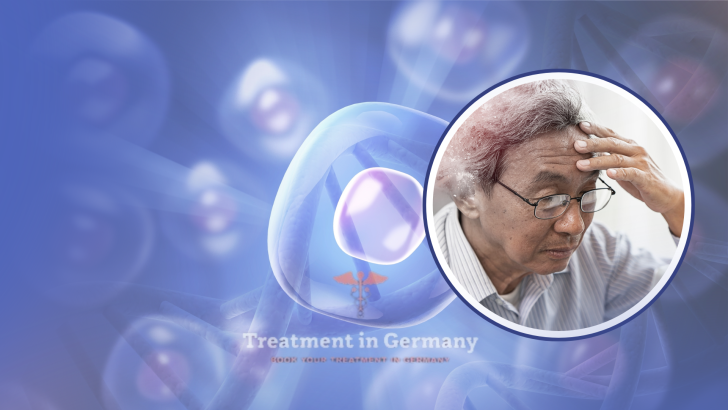
Dementia encompasses disorders like Alzheimer’s disease (60–70% of cases), vascular dementia (caused by reduced brain blood flow), and frontotemporal dementia (affecting behavior and language).
Dementia, a group of neurodegenerative disorders causing progressive cognitive decline, affects over 55 million people globally, with Alzheimer’s disease, vascular dementia, and frontotemporal dementia being the most prevalent forms. Germany, a leader in stem cell therapy for dementia patients, offers the best stem cell treatment for Alzheimer’s disease. Stem cell therapy involves using specialized cells to regenerate damaged brain tissue, reduce inflammation, and improve cognitive function, offering hope for stem cell therapy for memory loss and stem cell therapy for elderly dementia.
Dementia encompasses disorders like Alzheimer’s disease (60–70% of cases), vascular dementia (caused by reduced brain blood flow), and frontotemporal dementia (affecting behavior and language). These conditions impair memory, thinking, and daily functioning, with Alzheimer’s driven by amyloid-beta plaques and tau tangles, vascular dementia by vascular damage, and frontotemporal dementia by abnormal protein buildup. Stem cell therapy aims to regenerate neurons and improve brain function, particularly for early-stage dementia and advanced dementia.
Dementia causes include:
Alzheimer’s Disease: Amyloid-beta plaques, tau tangles, neuronal loss; genetic mutations in ~5% of cases.
Vascular Dementia: Stroke or small vessel disease impairing cerebral blood flow.
Frontotemporal Dementia: Tau or TDP-43 protein abnormalities; genetic mutations in ~10% of cases.
Risk Factors: Age (>65), hypertension, diabetes, smoking, and family risk factors for dementia.
Dementia Symptoms
Symptoms vary by type and stage:
Early-Stage Dementia: Memory lapses, word-finding difficulties, mild confusion.
Advanced Dementia: Severe memory loss, language impairment, behavioral changes.
Alzheimer’s: Progressive memory and cognitive decline.
Vascular Dementia: Stepwise decline, motor issues.
Frontotemporal Dementia: Personality changes, language deficits.
Dementia Diagnostic Tests
Dementia diagnostic tests guide stem cell therapy dementia eligibility criteria:
MRI/CT scans: Detect brain atrophy or vascular damage.
PET Imaging: Identifies amyloid plaques or inflammation.
Neuropsychological Tests: Assess memory, language, and cognition
Cerebrospinal Fluid Analysis: Measures amyloid-beta and tau levels.
Genetic Testing: Identifies risk genes (e.g., APOE4, TREM2).
Stem Cell Therapy for Dementia in Germany
Stem cell therapy is a regenerative treatment that uses stem cells, unique cells capable of differentiating into various cell types, including neurons to repair damaged tissues and modulate disease processes. For dementia, it involves mesenchymal stem cells (MSCs) from bone marrow, adipose tissue, or umbilical cord blood, neural stem cells (NSCs) that directly replace neurons, or induced pluripotent stem cells (iPSCs) derived from a patient’s own cells for personalized therapy.
These cells are administered to promote neurogenesis, reduce neuroinflammation, and enhance synaptic connectivity, addressing the neuronal loss and inflammation central to Alzheimer’s disease, vascular dementia, and frontotemporal dementia. Stem cell therapy dementia treatment centers in Germany, offer hope for stem cell therapy for memory loss and stem cell therapy for elderly dementia.
1. Best Stem Cell Treatment for Alzheimer’s Disease
Stem Cell Therapy Treatment Process:
Diagnostics: MRI, PET, cognitive tests to confirm diagnosis and eligibility.
Cell Harvesting: Autologous MSCs from bone marrow/adipose tissue or allogeneic umbilical cord cells are collected.
Cell Culturing: Stem cells are expanded in GMP-certified labs to ensure safety and potency.
Infusion: Intravenous or intrathecal delivery targets brain tissue.
Monitoring: Follow-up for 6–12 months to assess cognitive changes.
How It Works: MSCs reduce inflammation and promote neuronal repair; NSCs replace lost neurons; iPSCs offer personalized regeneration by differentiating into patient-specific neurons.
Effectiveness of Stem Cell Therapy in Dementia:
Early-Stage Dementia: ~30% cognitive stabilization; up to 90% show improved memory in trials.
Advanced Dementia: Limited cognitive gains but improved quality of life (e.g., mood enhancement).
Alzheimer’s Disease: Reduces amyloid plaques and inflammation in preclinical models.
Vascular Dementia: Improves white matter integrity.
Frontotemporal Dementia: Modest behavioral improvements.
Stem Cell Therapy Long-Term Results: Cognitive stabilization for 1–2 years; long-term data pending larger trials.
Stem Cell Therapy Side Effects Dementia
Stem cell therapy side effects dementia include:
Common: Mild fever, fatigue (~2% of cases).
Rare stem cell therapy dementia risks: Tumor formation (embryonic cells), immune rejection, infection (intrathecal delivery).
Stem Cell Therapy Dementia Eligibility Criteria
Early-Stage Dementia: Ideal candidates; mild cognitive impairment, confirmed diagnosis.
Advanced Dementia: Considered for quality-of-life improvements.
Exclusions: Severe comorbidities, high bleeding risk, active infections.
Stem Cell Therapy Dementia Aftercare Tips
Regular cognitive assessments.
Cognitive stimulation (puzzles, music therapy).
Nutrition tips for dementia patients: Omega-3s, antioxidants, low-sugar diets.
Light exercise to maintain function.
8. Stem Cell Therapy Dementia Natural Alternatives
Cognitive behavioral therapy.
Mediterranean diet and exercise.
Supplements (e.g., ginkgo biloba), though less effective.
Stem Cell Therapy Dementia Ethical Concerns
Embryonic stem cell use raises moral debates.
Informed consent challenges in advanced dementia.
High costs limit equitable access.
Stem Cell Therapy Dementia Recovery Time
Stem cell therapy dementia recovery time: Cognitive improvements within 4–6 months; full effects in 12–24 months.
Stem Cell Therapy Dementia Future Prospects
Larger trials to validate stem cell therapy dementia long-term results.
Personalized iPSC therapies and combination with anti-amyloid drugs.
🌍Why Patients Worldwide Prefer Our Medical Services in Germany – Key Benefits Explained:
Frequently Asked Questions (FAQs)
What is the best stem cell treatment for Alzheimer’s disease?
MSC therapy, shows ~30% cognitive stabilization.
What are stem cell therapy side effects dementia?
Mild fever, fatigue; rare risks include tumors or infection.
What are stem cell therapy dementia patient reviews?
Improved mood and cognition in early trials; quality-of-life gains in advanced cases.
What are stem cell therapy dementia risks?
Tumor formation, immune rejection, infection.
What are stem cell therapy dementia aftercare tips?
Cognitive stimulation, omega-3 diets, regular monitoring.
How can I access this stem therapy treatment in Germany?
Contact us today for a free consultation with our specialist medical advisor and receive direct guidance from the treating professor on the most suitable treatment options available in Germany.
Kindly complete the form below, and our dedicated team will reach out to you promptly. We look forward to connecting with you soon!
Trierer Straße, 56072 Koblenz, Germany

.webp)
 (1).webp)

.webp)
 (1).webp)


.webp)
 (1).webp)

.webp)
 (1).webp)
